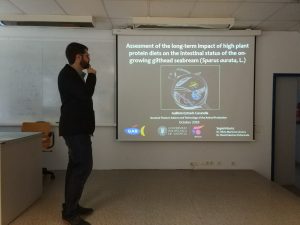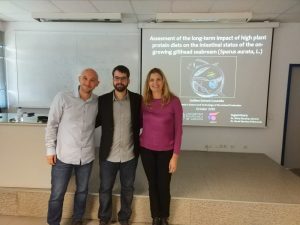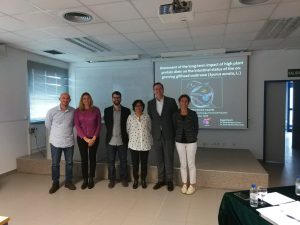on 26 octubre, 2018 by igjaugar in Doctorandos, Guillem Estruch Cucarella, Tesis doctorales, Comentarios desactivados en Tesis Guillem Estruch Cucarella
Tesis Guillem Estruch Cucarella
El pasado viernes 19 de Octubre de 2018, el Doctorando Guillem Estruch Cucarella, defendió su tesis doctoral, titulada “ASSESSMENT OF THE LONG-TERM IMPACT OF HIGH PLANT PROTEIN DIETS ON THE INTESTINAL STATUS OF THE ON-GROWING GILTHEAD SEA BREAM (Sparus aurata, L.)”, la cual tiene la mención de doctorado europeo y una calificación de cum laude.
Los directores de la tesis han sido Silvia Martínez Llorens y David Sanchez Peñaranda. El tribunal estuvo formado por los doctores Juan José Pascual Amorós (ICTA-UPV), como Presidente, Angela Trocino (University of Padova, UNIPD-Department of Comparative Biomedicine and Food Science), como vocal y Josefina Blasco Minguez (Universidad de Barcelona, UB- Departamento de Fisiología e Inmunología).



Abstract
Although the inclusion of plant protein sources at high levels in aquafeeds for on-growing gilthead seabream has been successfully achieved on gilthead seabream in terms of growth, these diets are still associated to detrimental effects in feed efficiency and immune capacity. The intestine is the organ where takes place the first interaction of the host with dietary antigen or environmental bacteria, and plays a major role in the digestion of nutrients and the inflammatory and the immune response. The present PhD thesis focus on the impact of classical formulated high plant protein diets on fish performance, but especially, on evaluation of the intestinal status in on-growing fish long term fed with high levels of fishmeal replacement.
Changes at intestinal level were characterized by using different approaches, including protein and amino acid digestibility and retention and ammonia excretion, digestive enzyme activity, histology, expression of genes related with inflammation, immunity, structure and digestion, but also using whole tissue-level techniques for the analysis of the impact on proteome and gut microbiota. Different levels of fishmeal replacement were assayed, although the impact of diets with total replacement, complemented by inclusion of alternative marine byproducts or supplemented by free amino acids, received greater attention. Total fish replacement produced a negative but minor impact on the growth and nutritive and digestive performance of on-growing gilthead seabream. Nevertheless, when fish were fed from juvenile stage with plant protein based diets, a higher negative impact in growth terms was noticed. Digestibility and metabolic use of amino acids was altered, but no differences were observed in the digestive enzyme activities. Nonetheless, feeding fish with total dietary fishmeal replacement by plant protein without any marine protein source was especially critical for survival rate. In these fish, gut histological assessment only revealed minor alterations related with an inflammatory response, but gene expression assay showed a down-regulation of several genes involved in the inflammatory and immune response. Moreover, a drastic change in the microbiota composition was observed, especially at the hindgut, revealing a possible lack of capacity to regulate a defensive response and to face with pathogen colonisation after a long-term coupling with these diet. Likewise, gut mucosa proteome analysis also suggests an impact on biological processes related with the maintenance of gut homeostasis and the epithelial integrity. In contrast, total fishmeal replacement did not induce alterations at transcript or proteomic level when diet was complemented with marine ingredients, although some minor inflammatory signs were reported. On the other hand, an ex vivo system to study the inflammatory and immune response of the gut mucosa to the presence of different bacteria was developed, and a preliminary assay evaluating the impact of the diet on this response was performed.
To sum up, present works represents a wide assessment at intestinal level of the effects of including plant protein sources at high levels in aqua feeds for on-growing gilthead seabream. Results indicate that alterations in the immune capacity, the gut homeostasis and the microbiota were observed when protein was exclusively provided by plant sources, and could explain the higher mortality reported with this diet.
Keywords: gilthead sea bream, protein sources, intestine, digestive capacity; immune system, microbiota, proteome, ex vivo assay


No hay comentarios